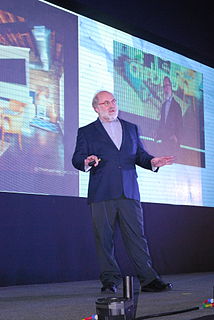A Quote by Morris Gleitzman
The type of stories I write are about young people grappling with the biggest problems in their lives, often problems that are bigger than they're actually capable of solving.
Related Quotes
Why doesn't Apple stop for a year and make medical devices? When people talk about technology, that's where I start to get a little hot under the collar because I know that it's the key to solving some of the world's biggest problems. Having a faster, thinner telephone is not one of the world's biggest problems.
If you're dealing with grappling [with] problems of feeding people, the biggest impact in fertility reduction is girls' schools. Schooled girls make a bigger impact on that than any other factor - not these various regulations [such as] you have to have one child or that. It turns out that none of these are effective.
Solving problems is fine, but it has gotten to the point of being a global obsession. We somehow have it in our heads that if we solve all of the problems, we can sit back and enjoy the easy life. But in reality, we become lazy and complacent. And that's when we get flooded with even bigger problems.
When people come to you with problems or challenges, don't automatically solve them. As a mama bear, you want to take care of your cubs, so you tend to be protective and insulate them against all those things. But if you keep solving problems for your people, they don't learn how to actually solve problems for themselves, and it doesn't scale. Make sure that when people come in with challenges and problems, the first thing you're doing is actually putting it back to them and saying: "What do you think we should do about it? How do you think we should approach this?".
More people have access to education today than ever before. But I cannot help but feel that the modern educational experience is not preparing us adequately to attend the rich banquet of life. Certainly the young people of today have mastered the use of technology and are capable of solving complex scientific and mathematical problems, but who and what do these serve if they cannot think for themselves? If they have no understanding of the meaning and purpose of their own lives? If they do not know who they are as individuals?
Most people define learning too narrowly as mere 'problem-solving', so they focus on identifying and correcting errors in the external environment. Solving problems is important. But if learning is to persist, managers and employees must also look inward. The need to reflect critically on their own behaviour, identify the ways they often inadvertently contribute to the organisation’s problems, and then change how they act.



































